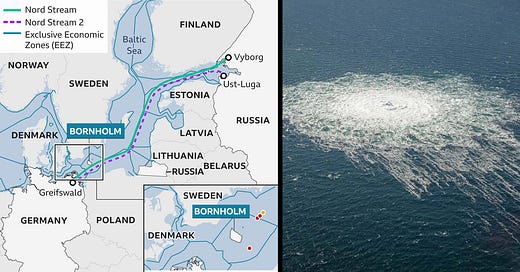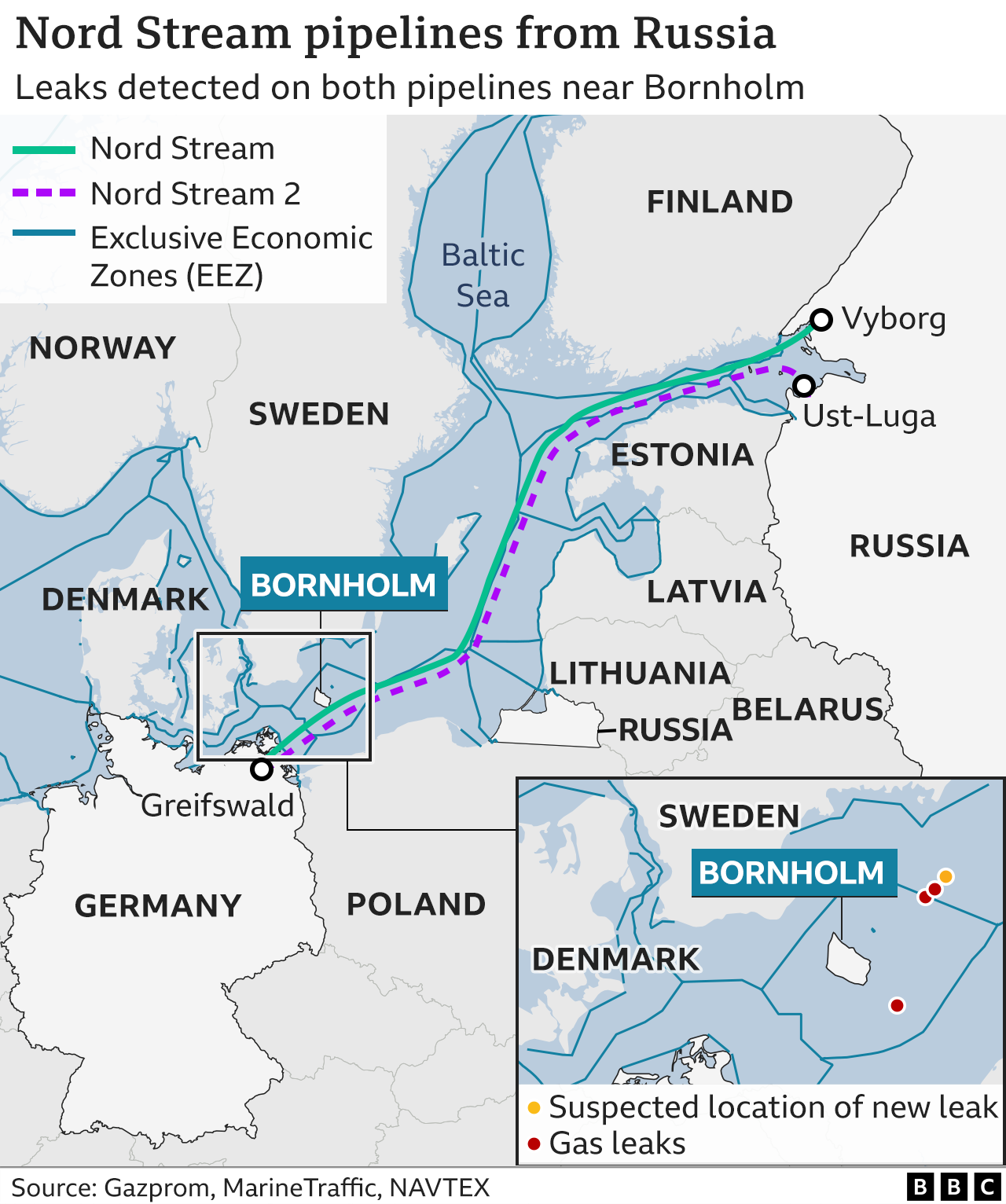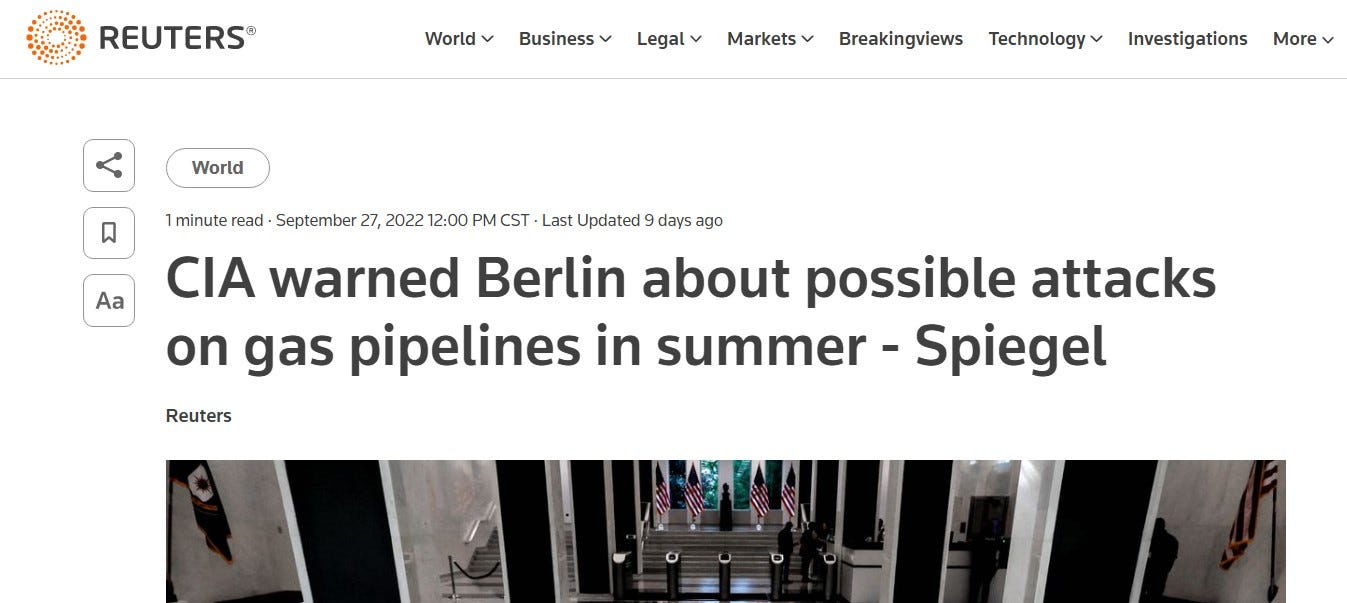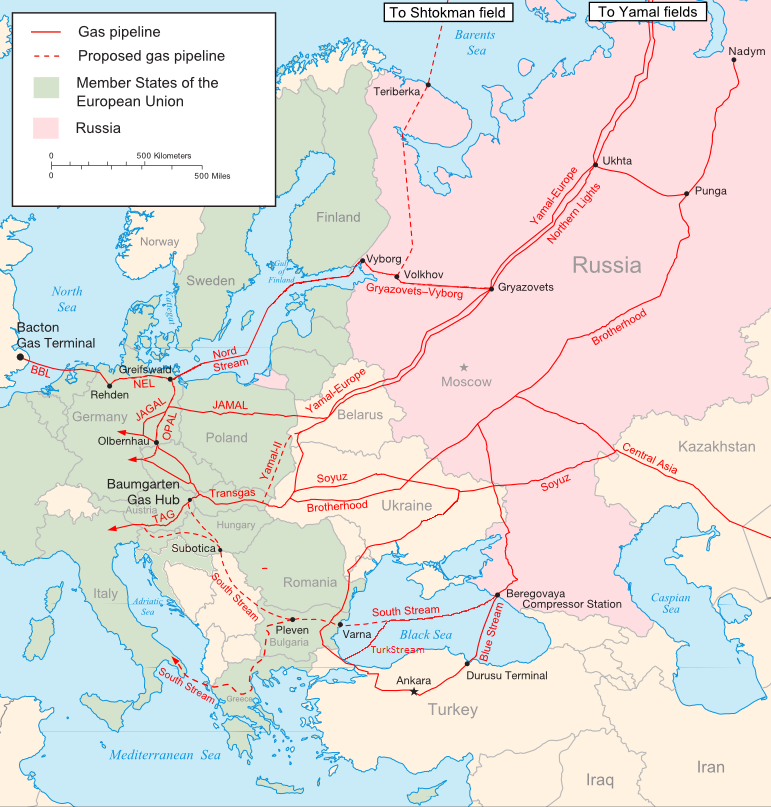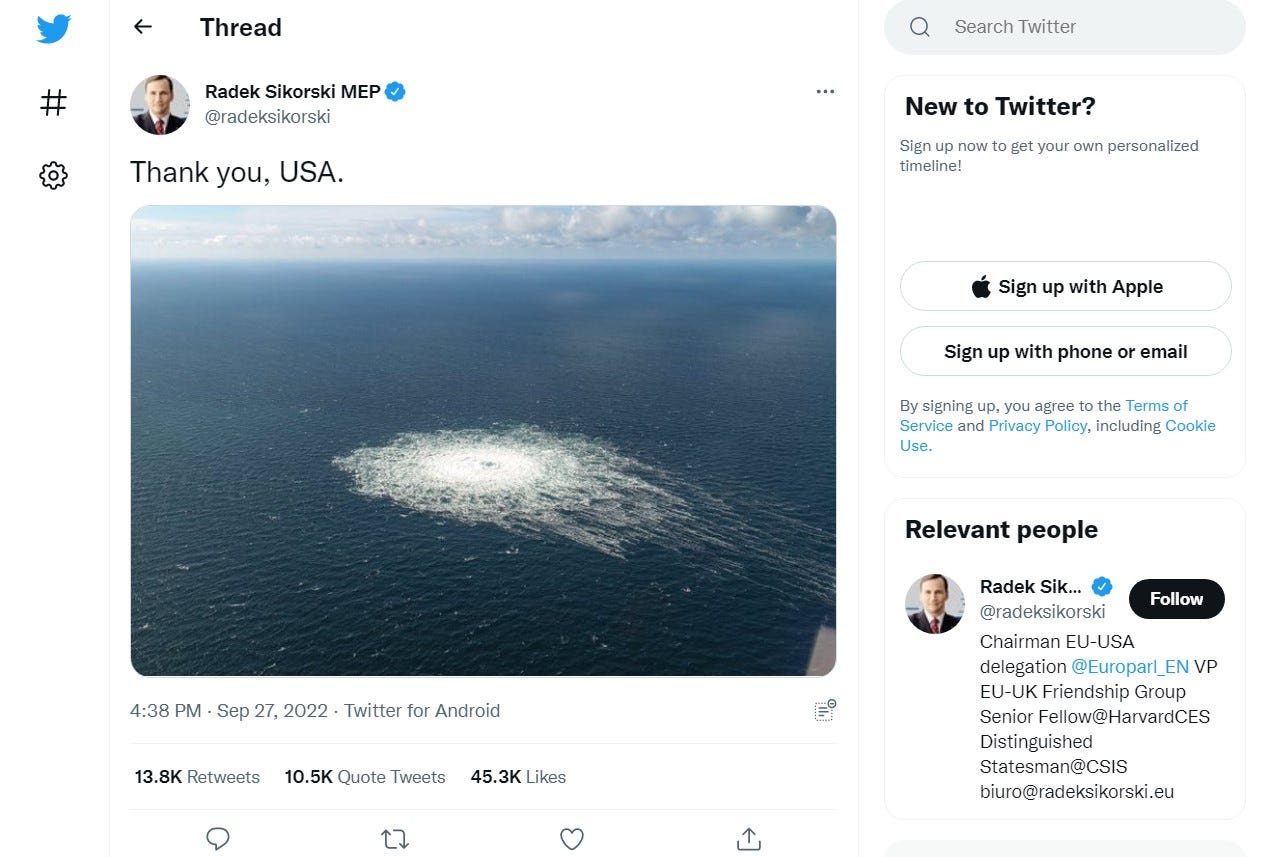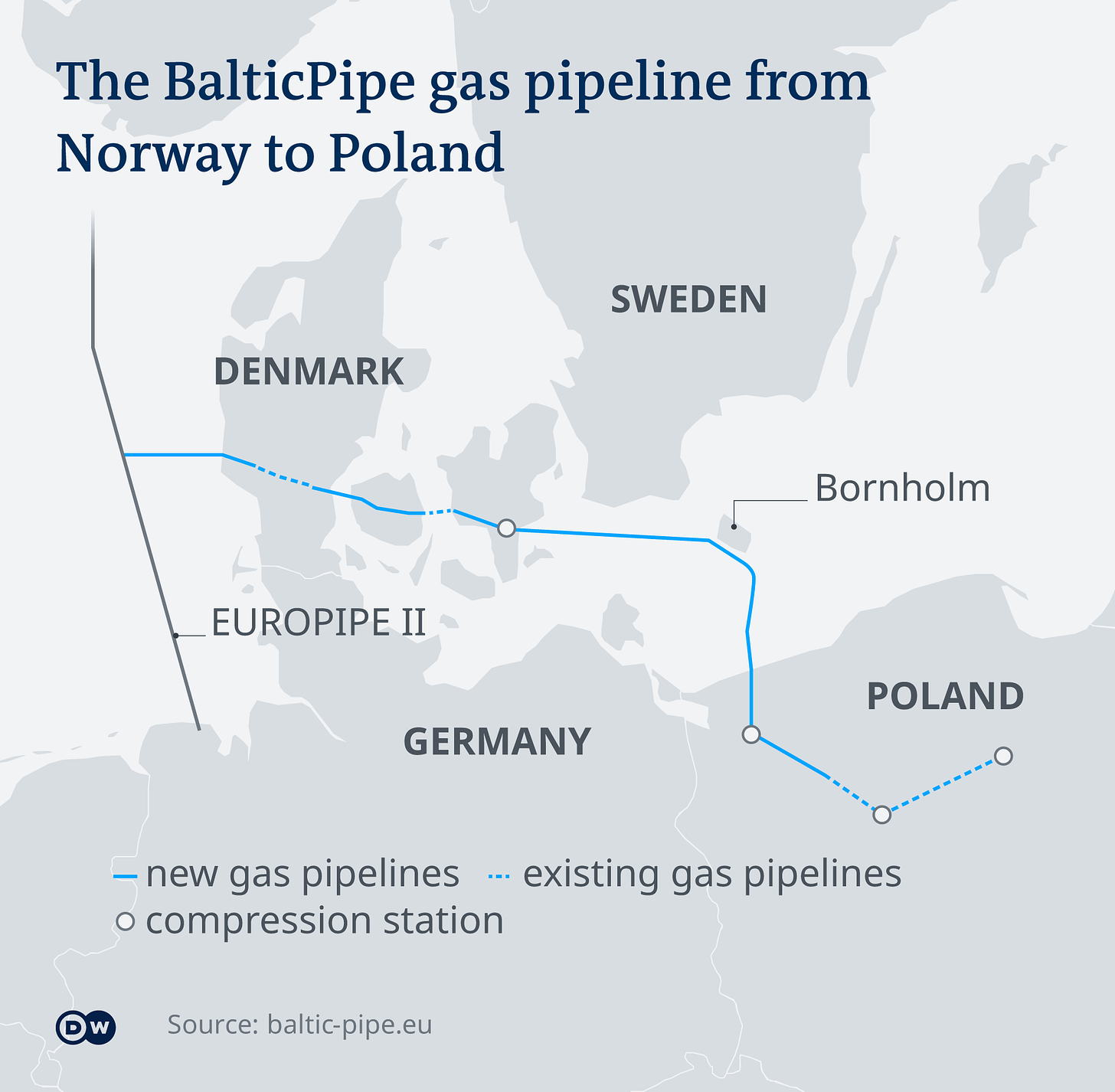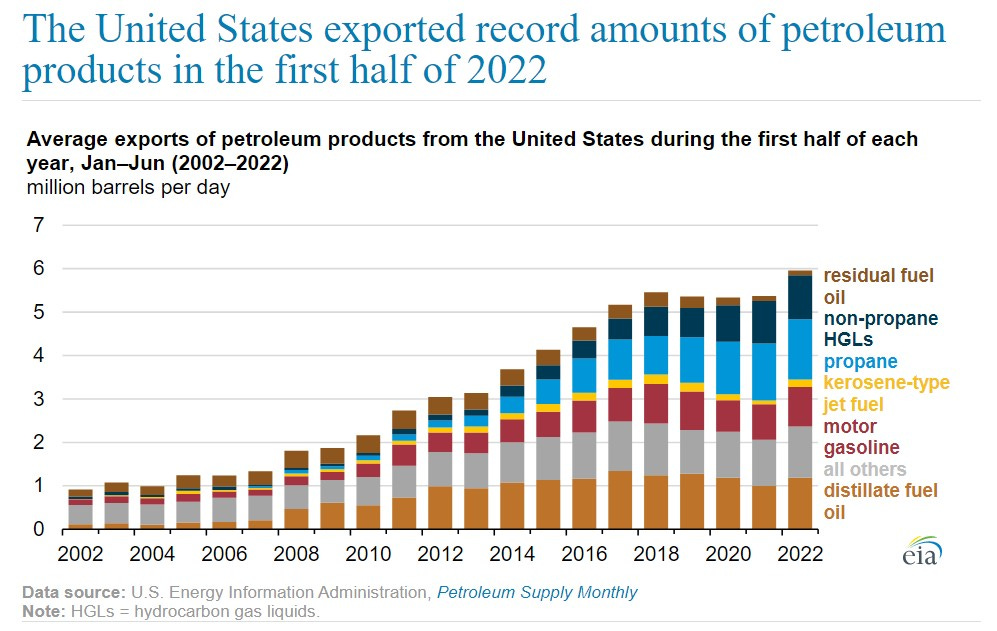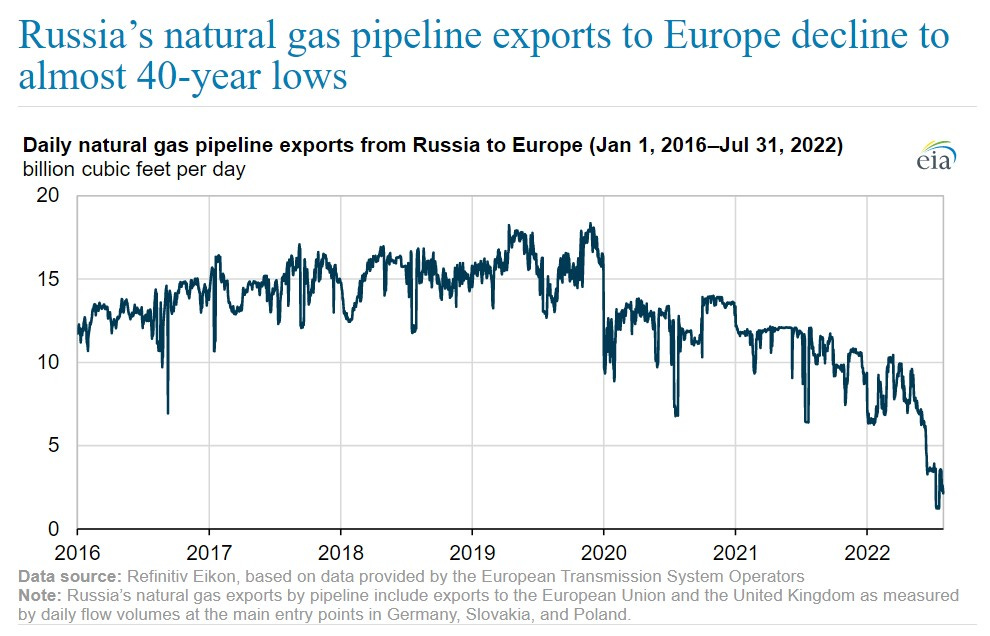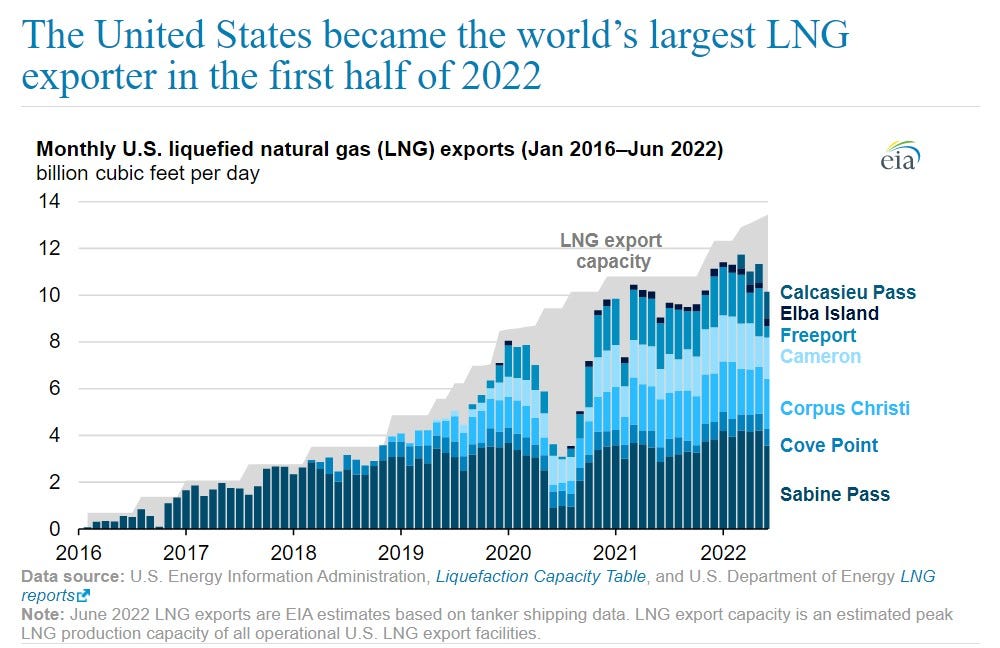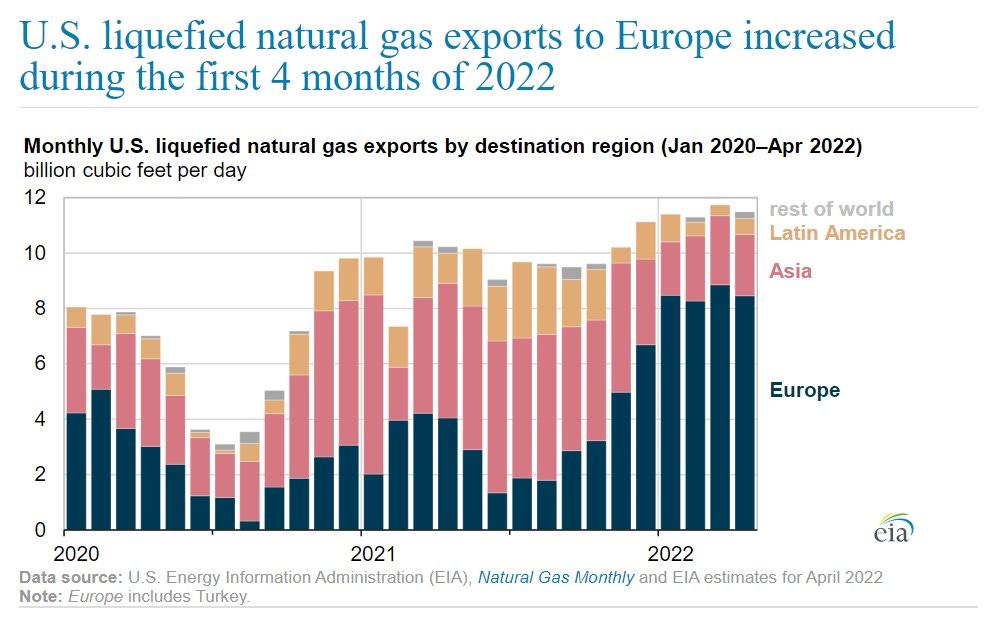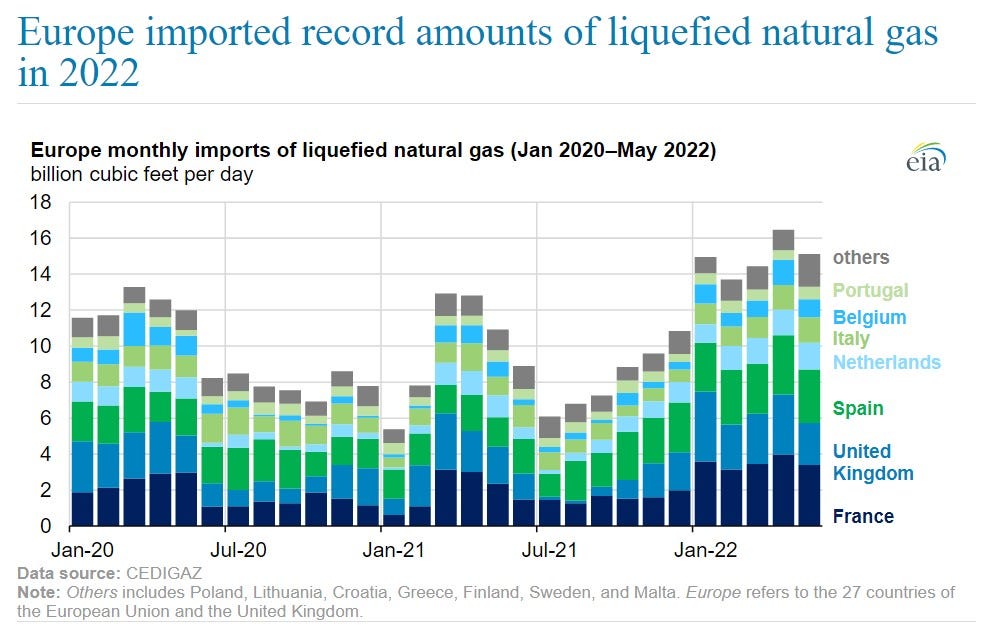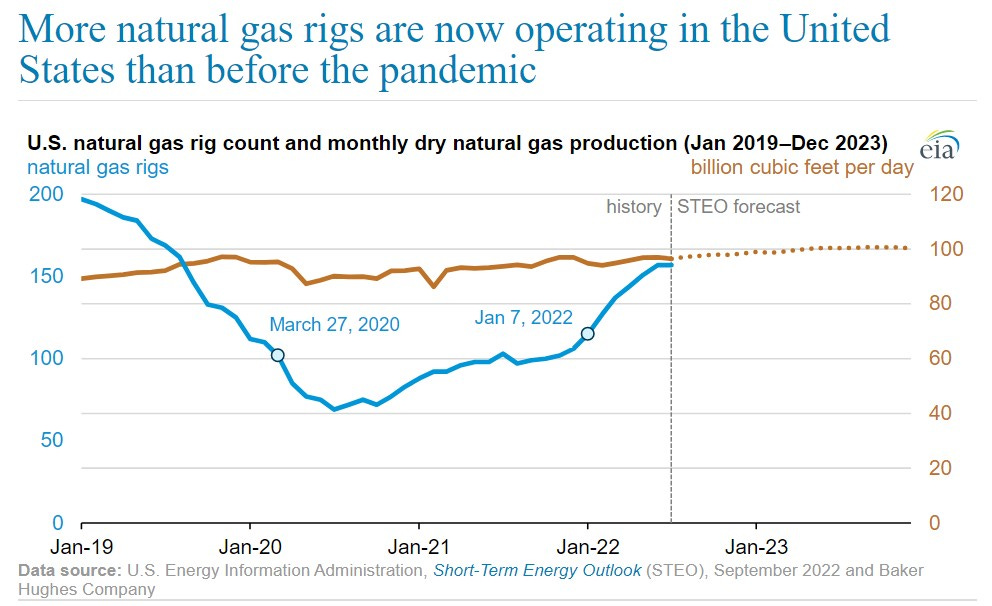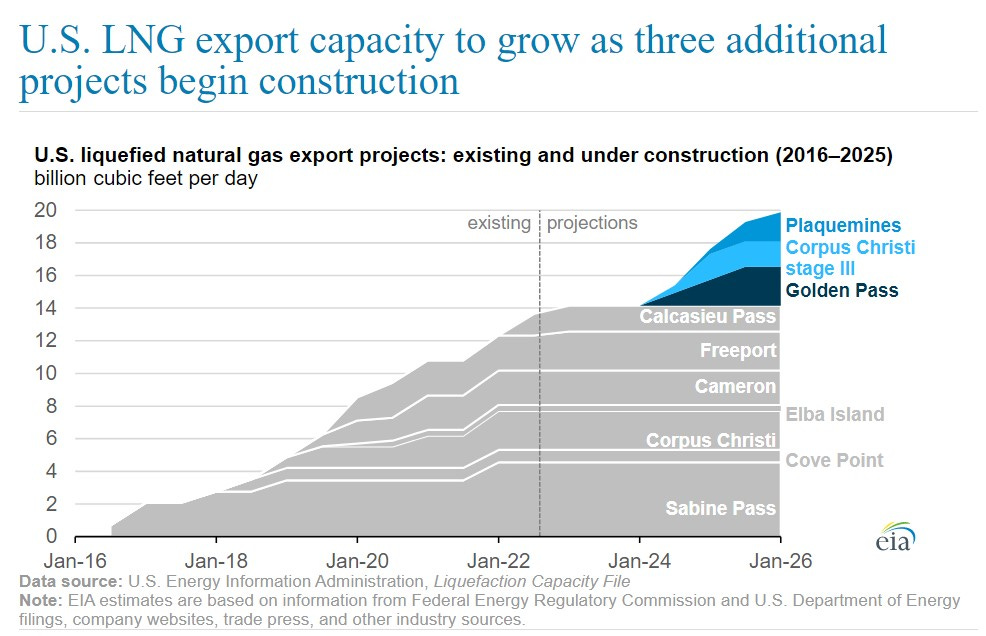Who sabotaged Nord Stream pipelines? US boasts 'tremendous opportunity' to weaken Russia. CIA knew
Russia’s Nord Stream pipelines with Germany were sabotaged hours before the EU opened its own Baltic Sea pipeline. US Secretary of State Antony Blinken called the attacks a "tremendous opportunity."
A pair of natural gas pipelines, Nord Stream 1 and Nord Stream 2, which were built to transport natural gas underwater through the Baltic Sea from Russia to Germany, were sabotaged in a series of explosions on September 26.
These suspicious attacks came mere hours before NATO members Norway, Denmark, and Poland officially opened their own natural gas pipeline, called the Baltic Pipe, which was built with European Union funding in order to compete with Nord Stream.
The Nord Stream pipelines are operated by company that is majority owned by Russia's state gas giant Gazprom. Authorities in Norway and Denmark have blocked that company from inspecting the damage done to its own pipelines. That is to say, NATO member states have prevented the Switzerland-based company Nord Stream AG from conducting an investigation into the attacks on its property.
Meanwhile, top officials in Washington have been positively giddy. US Secretary of State Antony Blinken enthusiastically called the attacks on Nord Stream a "tremendous opportunity" to weaken Moscow.
The US fossil fuel industry has made a killing off of the proxy war in Ukraine. Western sanctions on Russia in response to its February 24, 2022 invasion of its neighbor have propelled the United States into becoming the world's largest exporter of liquified natural gas (LNG). Much of that LNG has gone to Europe to make up for the drastic decline in Russian exports.
NATO member Norway has also greatly benefited. It was already the largest oil and gas producer in Europe, even before inaugurating the Baltic Pipe, just one day after Nord Stream was sabotaged.
The fact that an attack on Nord Stream was being planned was known in advance. By whom? None other than the CIA. The notorious US spy agency warned Germany weeks before the explosions.
An expert in information warfare, former CIA Director John Brennan crafted an elaborate conspiracy to explain the sabotage of Nord Stream. He was joined by the ex chief of Germany's spy agency the BND in accusing Russia of intentionally damaging its own pipelines.
Although there is not a scintilla of evidence for this CIA-concocted conspiracy, it was enthusiastically repeated by Western governments and corporate media outlets.
Moscow, for its part, said the US and its Western allies were responsible for the sabotage, which Russian President Vladimir Putin condemned as a grave act of "international terrorism."
The head of the Russian Security Council, Nikolai Patrushev, pointed out that the CIA has a documented history of carrying out attacks like these. He recalled that the spy agency bombed pipelines in Nicaragua in 1983, as part of the US terrorist war on the Central American nation's revolutionary Sandinista government.
Months before the attacks on Nord Stream, top officials in Washington made foreboding comments threatening the pipelines.
In February, President Joe Biden pledged that, if Russia invaded Ukraine, "We will bring an end to [Nord Stream]."
US State Department spokesperson Ned Price and the third in command of the department, Victoria Nuland, likewise promised in January 2022 that "Nord Stream 2 will not move forward."
In 2020, the Donald Trump's administration secretary of state, Mike Pompeo, declared that the United States would "do everything we can" to stop Nord Stream.
Washington has officially denied responsibility for the sabotage, instead pointing the finger Moscow. But these deeply provocative remarks by senior US officials have raised eyebrows around the world.
US Secretary of State Blinken boasts Nord Stream sabotage is 'tremendous opportunity to remove dependence on Russian energy'
US Secretary of State Antony Blinken gloated that the attacks on Nord Stream offered a "tremendous opportunity" to weaken Russia.
"Ultimately this is also a tremendous opportunity. It’s a tremendous opportunity to once and for all remove the dependence on Russian energy," Blinken said. "That’s very significant, and that offers tremendous strategic opportunity for the years to come."
US fossil fuel corporations in particular are reaping the rewards of this "tremendous opportunity."

The top US diplomat noted that "we’ve significantly increased our production as well as making available to Europe liquefied natural gas. And we’re now the leading supplier of LNG to Europe to help compensate for any gas or oil that it’s losing."
Blinken made these comments in a September 30 press conference with Canadian Foreign Minister Mélanie Joly. She echoed, "we have increased our production, and, therefore, by increasing our production, we have exported to the U.S. for it to be eventually sent to Europe."
The top Canadian diplomat advertised a new liquified natural gas facility, Kitimat, that Ottawa plans to use to increase supply of LNG to Europe.

It is not just the North American energy industry that stands to heavily profit from the sabotage of the Nord Stream pipelines. Ukraine benefits as well.
By using Nord Stream to send Germany natural gas through the Baltic Sea, Russia could cut out the intermediary of Ukraine, which was making billions of dollars in transit fees.
While Western governments have pinned the blame on Russia, without a shred of proof, it makes no strategic sense that Moscow would sabotage its own pipelines, after investing billions of dollars in the project.
Russia has even floated the possibility of investing more money to repair the pipelines. This would be a very strange move after bombing your own energy infrastructure.
Yet the German government publicly rejected Russia's offer to repair the pipelines. A spokesperson said Berlin would not accept Russian gas via Nord Stream 2, even if it is fixed.
Top Polish official thanks US for Nord Stream sabotage
One day after the sabotage of the Nord Stream pipelines, a prominent right-wing politician from Poland, who previously served as foreign minister and defense minister of the NATO and EU member, Radek Sikorski, all but openly stated that the United States was responsible.
"Thank you, USA," Sikorski tweeted, alongside a photo of the underwater gas leak in the Baltic Sea.
Sikorski is an infamous anti-Russia hawk, and the husband of influential US neoconservative Anne Applebaum. Today he sits as an influential member of the European Parliament, and chairs its delegation for relations with the United States.
Sikorski later deleted the tweet, but not before it was archived.
Among pro-US politicians in Europe, Nord Stream had long been unpopular, and the pipelines had faced many threats before.
Independent researchers pointed out on social media that, back in 2015, Swedish authorities discovered a drone rigged with explosives near Nord Stream 1.
The country of origin of the drone was never disclosed.
Every year, NATO organizes military exercises in the Baltic Sea, in which the US-led military alliance uses drones to clear sea mines. The 2022 exercises were held in June.

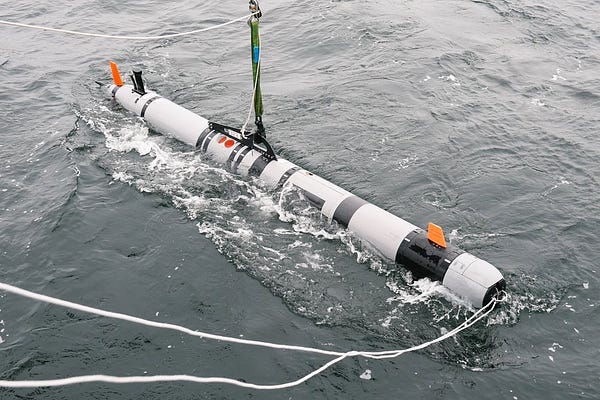
As intrepid investigators showed on Twitter, the US Navy conducted military exercises near the Danish island of Bornholm - precisely where Nord Stream was attacked on September 26.
The US and British armed forces have also been training Ukraine's military to hunt for mines with underwater drones, and held exercises as recently as August 26.


US government pledged to 'do everything' to 'bring an end' to Nord Stream
The September 26 attacks on Nord Stream took place right at the moment when Russia was overseeing referenda to incorporate the Ukrainian regions of Donetsk, Luhansk, Zaporizhzhia, and Kherson into the Russian Federation.
Russia had invaded Ukraine on February 24. But in the months leading up to what Moscow called its special military operation, senior US government officials publicly threatened Nord Stream.
"If Russia invades," Joe Biden said on February 7, "then there will be no longer a Nord Stream 2. We will bring an end to it."
The US president made this pledge in a press conference with German Chancellor Olaf Scholz.
When a journalist asked Biden, "How will you do that exactly, since the project and control of the project is within Germany's control?", the US leader responded cryptically, "I promise you, we will be able to do it."

The former CIA director and secretary of state in the Donald Trump administration, Mike Pompeo, made similar remarks in 2020. In a July 30 Senate Foreign Relations Committee hearing, he condemned Nord Stream 2, which was still under construction at the time, as "dangerous" and a "threat."
"We will do everything we can to make sure that that pipeline doesn't threaten Europe," Pompeo reassured lawmakers.
He threatened to impose more sanctions on parties involved in Nord Stream 2, and said proudly of the Trump administration, "We're the toughest administration ever on Russia."

Nord Stream was also targeted by the third in command of the US State Department, Victoria Nuland, a bellicose neoconservative and hard-line anti-Russia hawk who oversaw the 2014 coup in Ukraine, in which the country's democratically elected, geopolitically neutral President Viktor Yanukovich was violently overthrown and replaced with a compliant pro-Western, vehemently anti-Russian regime.
In a press conference on January 27, Nuland pledged, "With regard to Nord Stream 2, we continue to have very strong and clear conversations with our German allies, and I want to be clear with you today: If Russia invades Ukraine, one way or another, Nord Stream 2 will not move forward."

These exact comments had been echoed the day before by US State Department spokesperson Ned Price, a former CIA analyst.
Price told NPR, "I want to be very clear: if Russia invades Ukraine one way or another, Nord Stream 2 will not move forward."
"I'm not going to get into the specifics," Price added. "We will work with Germany to ensure it does not move forward."
Germany threatened Nord Stream before the Russian invasion of Ukraine
Nord Stream 1 was officially opened in 2011. The pipeline provided Germany with natural gas for years, until it was temporarily shut down in 2022 due to the proxy war in Ukraine.
At the time of the September 26, 2022 attacks, Nord Stream 1 was not in use. In response to strict Western sanctions on Russia, Moscow shut off gas deliveries.
After years of construction, Nord Stream 2 was completed in September 2021. But the pipeline never became operational, as German authorities repeatedly delayed certification of it.
Top German officials made it clear that Berlin's unwillingness to give a green light to the completed pipeline was politically motivated.
Foreign Minister Annalena Baerbock, of Germany's avowedly pro-NATO and anti-Russia Green Party, was deeply opposed to Nord Stream. And in a speech at the NATO-backed Munich Security Conference on February 18, a week before Russia invaded Ukraine, she threatened to stop the pipeline.
Baerbock warned that, if "Russia takes action against Ukraine," the "sanctions would be without precedent and would be coordinated and prepared with all partners."
"For me, for us, all options are on the table, including Nord Stream 2," Baerbock.
She added, "We, as Germany, are prepared to pay a high economic price for this ourselves."

This context is what led even some prominent figures like Columbia University Professor Jeffrey Sachs to suspect that the United States is responsible.
Sachs is a mainstream US economist who helped Washington design the program of neoliberal capitalist shock therapy that it imposed on the former Soviet Union in the 1990s. He has since become a critic of the US government's extremely belligerent foreign policy.
In an interview with Bloomberg, Sachs argued "the destruction of the Nord Stream pipeline" was likely "a US action, perhaps US and Poland."

EU-backed Baltic Pipe seeks to replace Russia's Nord Stream
Another country that stands to gain a lot from the sabotage of Nord Stream is NATO member Norway.
The day after the suspicious explosions damaged Nord Stream, European authorities celebrated the opening of the Baltic Pipe, which will deliver gas from the North Sea off the Norwegian coast to Denmark and then to Poland.
Since the NATO proxy war in Ukraine escalated in February 2022, following the Russian invasion, Norway became the largest oil and gas producer in Europe.
This pipeline was partially funded by the European Union and developed by Danish state-owned company Energinet and Polish state-owned company Gaz-System.
The Baltic Pipe was envisioned as a direct competitor with Nord Stream. Germany's state media outlet DW trumpeted, "Baltic Pipe speeds up exit from Russian gas."
Norway’s Energy Minister, Terje Aasland, hailed the Baltic Pipe as "an important step on the important road to Europe’s independence from Russian energy."
Norway's gas production is now at its highest ever level, and Aasland told Reuters that the country expects to "maintain the high gas volumes going forward" until at least 2030, benefiting from the decrease in Russian exports to Europe.
Meanwhile, Norway and Denmark, which have a vested financial interest in seeing Nord Stream go permanently offline, have denied access to Nord Stream AG, the majority Russian state-owned company that manages the pipelines.
Nord Stream AG complained that it "is unable to inspect the damaged sections of the gas pipeline due to the lack of earlier requested necessary permits" from Norwegian and Danish authorities.
At the opening ceremony of the Baltic Pipe on September 27, numerous Polish government officials emphasized how important the EU-backed pipeline would be to weaken Moscow. Polish Prime Minister Mateusz Morawiecki gloated, "The era of Russian domination in the field of gas is coming to an end."
"For the past years, we have been preparing to gain independence from an unreliable partner – the Russian Federation," echoed Poland's minister of climate and environment, Anna Moskwa. "In these uncertain times, our situation is stable."
The Polish government's top diplomat for strategic energy infrastructure, Mateusz Berger, added at the ceremony, "The opening of Baltic Pipe, a new corridor for natural gas supply from the Norwegian Shelf to Poland, will go down in history as a symbol of breaking away from our country’s long-standing energy dependence on Russia."
US Energy Information Administration boasts record gas exports to Europe amid proxy war on Russia
Along with Norway, the US fossil fuel industry has substantially benefited from the proxy war in Ukraine.
In 2020, Russia was the largest supplier of oil and gas to Europe. Official EU data show that Russia provided 43% of its natural gas imports (followed by 21% from Norway), 29% of its crude oil (followed by 9% from the United States and 8% from Norway), and a staggering 54% of its coal (followed by 16% from the United States).
Some individual EU member states relied even more on cheap Russian energy. Germany imported as much as 66% of its gas from Russia in 2020 (followed by 21% from Norway).
But as Europe vows to boycott Russian energy, the United States has sought to take its place.
Washington's Energy Information Administration (EIA) has spent months boasting in its regular press releases of the rapid growth of US exports.
In September the EIA trumpeted, "The United States exported record amounts of petroleum products in the first half of 2022."
In the six months from January to June 2022, US exports of petroleum products hit their highest ever recorded level, at almost 6 million barrels per day, the EIA reported.
US exports of petroleum products increased in the first half of 2022 by 11% compared with the same period in 2021.
The EIA noted that EU sanctions that were adopted in June to ban imports of Russian energy do not take effect until December 2022 for crude oil and February 2023 for petroleum products. Washington expects to see a further increase in US energy exports to Europe after then.
Although the blanket prohibition on Russia's energy has not yet been implemented, the EIA gloated in August, "Russia’s natural gas pipeline exports to Europe decline to almost 40-year lows."
The US government agency noted that Russian natural gas exports by pipeline to the European Union and Britain decreased by nearly 40% in the first seven months of 2022 compared with the same period in 2021, and by nearly 50% compared with the five-year average from 2017 to 2021.
Russia's energy exports to Europe initially decreased in 2020 due to the effects of the Covid-19 pandemic. But they continued to drop throughout 2021, as political tensions between NATO and Moscow grew.
Nord Stream 1 had been the largest source of Russian pipeline gas exports to Europe. The sabotage of the project will cut it off completely.
While Russia's energy exports to Europe have plummeted, the EIA boasted in July, "The United States became the world’s largest LNG exporter in the first half of 2022."
US liquified natural gas exports increased by 12% in the first half of 2022, compared with the second half of 2021.
The EIA explained that this was partially because of "increased global demand, particularly in Europe."
US LNG exports are significantly more expensive than the cheap pipeline gas Europe was buying from Russia. But while European economies suffer through a crisis caused by skyrocketing energy prices, US gas producers are profiting from European citizens' misery.
In the first four months of 2022, the US exported 74% of its LNG to Europe, compared to an average of just 34% in 2021.
Asia had been the top customer for US LNG in 2020 and 2021, but now Europe has become the main destination, as Russian exports have dwindled.
"Europe imported record amounts of liquefied natural gas in 2022," the EIA reported.
It noted that LNG imports to the EU and UK "set an all-time historical record high in April 2022."
While Europe is importing more and more US LNG, natural gas production inside the United States is steadily increasing.
The EIA reported in September that "U.S. natural gas producers are operating more drilling rigs now than at the beginning of the COVID-19 pandemic in early 2020."
The EIA boasted that same month, "As of July 2022, the United States has more LNG export capacity than any other country and has exported more LNG than any other country."
And the US is further expanding its LNG production by developing three new export projects.
During his presidential campaign, Joe Biden correctly observed that "climate change poses an existential threat – not just to our environment, but to our health, our communities, our national security, and our economic well-being."
The Biden campaign vowed to pursue "a Clean Energy Revolution," and pledged to cut back on drilling and implement environmental protections.
But since entering office, Biden has been even more conciliatory to the fossil fuel industry than his Republican predecessor Donald Trump.
The Washington Post reported in December that the "Biden administration has approved more oil and gas drilling permits on public lands per month than the Trump administration did during the first three years of Donald Trump's presidency."
The Center for Biological Diversity reported in January, before the drastic escalation in the NATO proxy war on Russia, that the Biden administration had "approved 3,557 permits for oil and gas drilling on public lands in its first year, far outpacing the Trump administration’s first-year total of 2,658."
US fossil fuel extraction has only increased further since then, as Washington takes advantage of the sanctions on Russia and turns Europe into a captive market for its gas.
The sabotage of the Nord Stream pipelines will only further help the United States and Norway replace Russia as the top energy suppliers to Europe.


